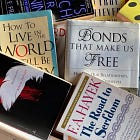On Voting, Lesson 4: Life isn't Zero-Sum
Seek a candidate who understands that the breathtaking progress of the past few centuries has occurred because of liberty, not the heavy hand of government.
Steven Pressfield has written best-selling historical fiction books such as Gates of Fire and Tides of War. He also writes nonfiction, and few books have helped me more as a writer than Pressfield’s The War of Art.
When Pressfield talks about writing, I listen. Pressfield has explained the hero/villain dichotomy well.
In movies and literature, the hero is the one who changes. Villains don’t change; they go on being villainous in fairly predictable ways.
Applying Pressfield’s essays on heroes, we can consider whether a candidate is a villain who says predictable things and is unwilling to learn and change.
Pressfield writes, “The Villain believes in a world of scarcity.” Describing a zero-sum view of life, he explains, “[The Villain’s] point of view is predicated upon the notion that if he is to survive and even prosper, he must take from you and me. No other equation exists for him. He cannot conceive of any other world.”
Listen during debates and interviews for the candidate who doesn’t believe life is zero-sum. Many candidates propose significantly increasing taxes or restricting competition to redistribute to groups they favor.
Pressfield asks, “Is life really zero-sum? Is this truly the way the world works?” He continues, “The hero doesn’t think so.” Nor, I might add, do economists.
“The zero-sum view of life is that of limited resources,” Pressfield explains. He explains:
Not enough to go around. If you and I want our share (or even simply enough to survive), we must take it from somebody else. However much of the pie we grab, that’s how much less remains for everyone else.
Pressfield adds, “The protagonist in most (but not all, be it said) novels and movies is the character who is capable of a non-zero-sum answer.”
“If the Villain believes in a universe of scarcity,” writes Pressfield, “the Hero believes, if not in a world of abundance, then at least in the possibility of such a world.”
Seek a candidate who advocates policies that will increase abundance in the world.
Dee Hock, the legendary founding CEO of Visa, has written, “From no more than dreams, determination, and the liberty to try, quite ordinary people consistently do extraordinary things.”
Seek a candidate who understands that the breathtaking progress of the past few centuries has occurred because of liberty, not the heavy hand of government.
As Pressfield points out, villains see themselves as good guys:
The Villain is not necessarily ‘bad’ or even ‘villainous.’ In the villain’s eyes, he is the Good Guy. He is simply acting and making choices within a universe of monsters. He must therefore become, in the name of Good (or at least self-preservation or the preservation of those dear to him) a monster himself.
I see many villains in politics who want to control human progress. Their controls will end human progress.
Pressfield writes, “The villain wants the same thing at the end of the story as he or she did at the start.” Between now and election day, most candidates will want to expand government.
“If the villain were capable of change, he’d be the hero,” Pressfield writes.
Look for a candidate willing to become a hero by learning that expanding government is not the way to prosperity.
It’s hard for such candidates to win. Why? Because when candidates give long-winded speeches justifying their villainous schemes, their minions cheer.
How could a non-zero-sum candidate be successful when so many Americans are zealously advocating for the zero-sum schemes of their favorite political champion? If politicians are villains, it’s because many Americans have become villains.
Indeed, the hero is the one who changes. And change must begin with us.
To begin to change, root out zero-sum thinking in your mind. Become more aware of the comparisons you make about who has more and the envy you feel.
Most importantly, ask who you think is in charge of your destiny. If you think it’s a politician, you will likely want them to favor you in a zero-sum world.
Donald Miller, in his book Hero on a Mission, writes,
Psychologists have a name for the act of surrendering power to outside forces. It’s called an “external locus of control.” It means that the person surrendering power believes external forces are in charge. An internal locus of control means we believe that, to a large degree, we are actually in control of our own destinies. But an external locus of control means we believe we are helpless to outside forces.
Do we respect and value our own agency? If we don’t, we will value villainous politicians.
Study and reflection are necessary to guide our conduct and maintain liberty. Please consider becoming a paid subscriber and accessing the Mindset Shifts U community. We are committed to deepening our understanding of the principles that support inner and outer freedom.







A contrarian opinion: https://www.youtube.com/watch?v=zhMB-hAczVY